Meet the woman turning Yellowknife's fish waste into gardening gold
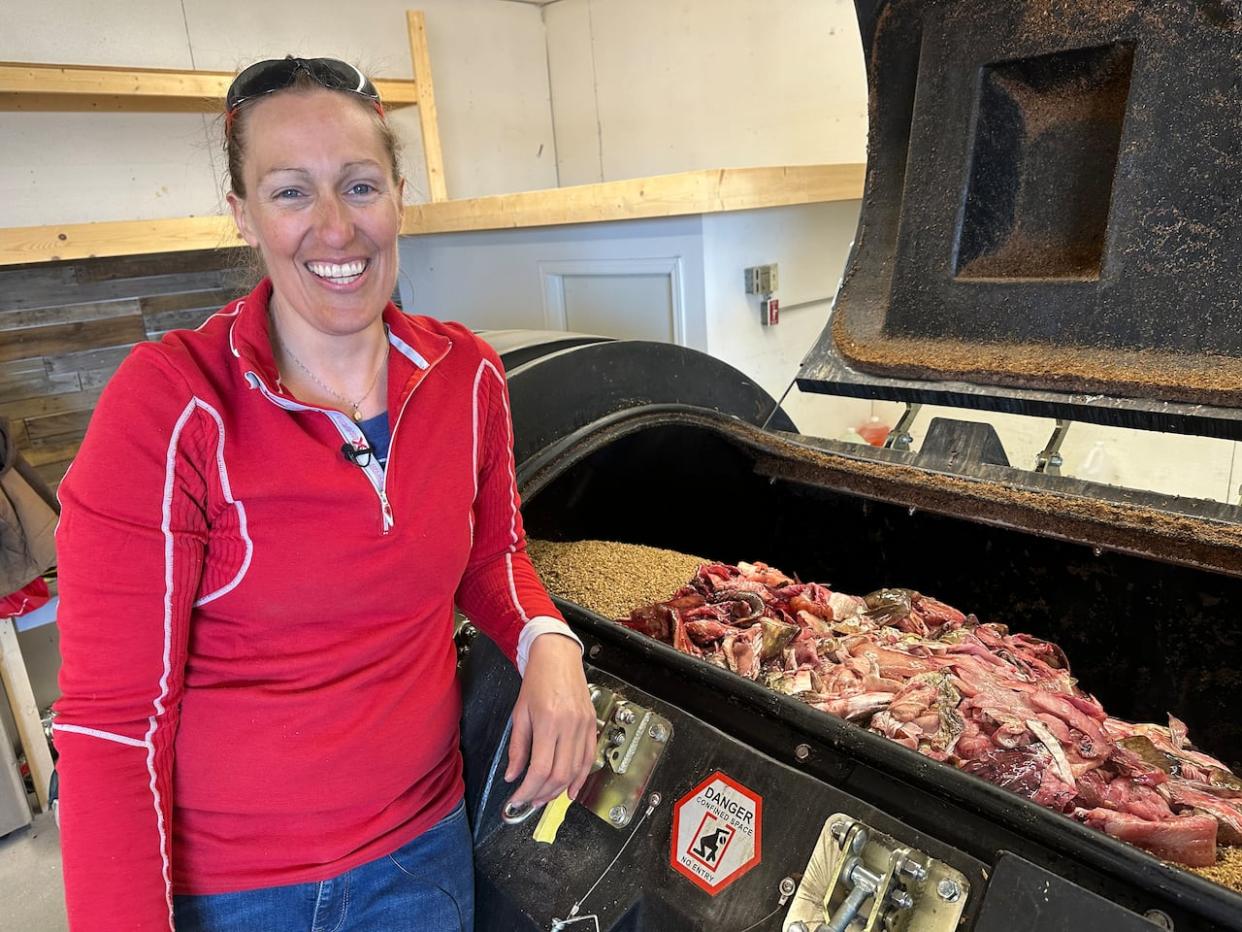
- Oops!Something went wrong.Please try again later.
- Oops!Something went wrong.Please try again later.
Stéphanie Vaillancourt, who runs a commercial fishing business in Yellowknife, scrapes fish guts from her cutting board into a bin at her trailer in Old Town.
"Got lots of little eyes looking at us," the Fish on the Bay founder said, peering inside at the bits of whitefish, cod and trout.
Up until recently, she would return those unwanted parts to Great Slave Lake. That meant hauling the bins back out by boat or snowmobile, dumping them on the ice or in the water, and cleaning up after.
"It's a bit of a pain," she said.
Now a better solution is taking shape.
Karine Gignac, who started helping fillet Vaillancourt's catch early last year, quickly saw an opportunity to turn those fish heads, spines, scales and skin into compost for peoples' gardens.
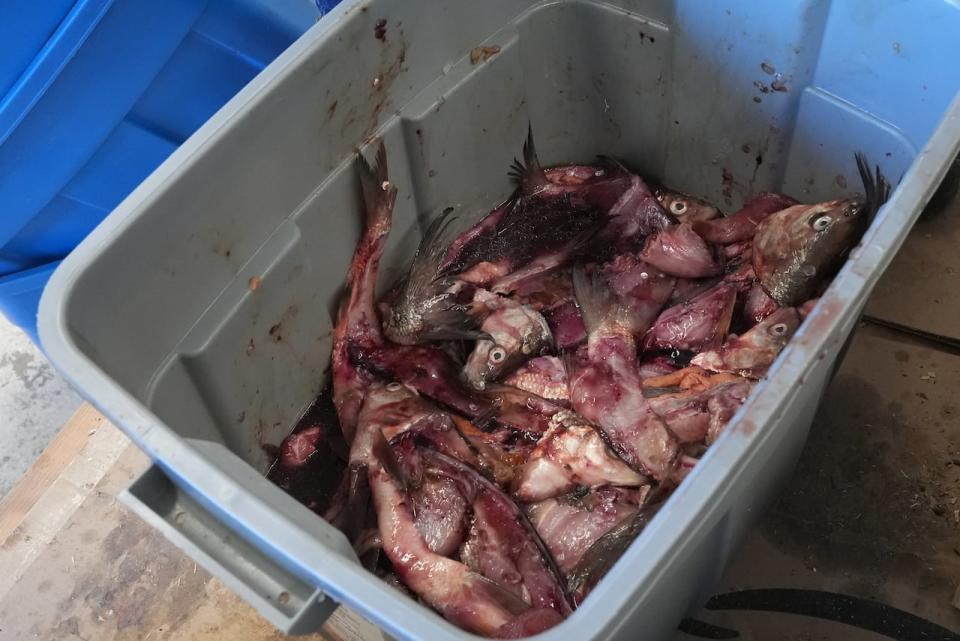
Gignac collects scraps from 2 commercial fishing businesses in Yellowknife: Fish on the Bay and N.W.T. Fish. (Julie Plourde/Radio-Canada)
"We don't have really good soil or soil amendments [in Yellowknife]," she explained. "Everything is imported from [the] South, and I just thought it would be a great way to actually produce something that is made from local ingredient[s]."
Nearly a year and a half later, just as gardening season ramps up, Gignac is on the verge of selling fish compost in Yellowknife. It's an idea into which she's poured countless hours and tens of thousands of dollars so far.
A train-like composter
A key component of Gignac's business, Net Composting Solutions, is a huge cylindrical composter tucked inside a building in Yellowknife's Kam Lake industrial area.
It's about 10 metres long and a metre and half wide, with a hatch on top where the ingredients go: scraps from commercial operators Fish on the Bay and N.W.T. Fish, spent grain from N.W.T. Brewing, and woodchips. Gignac said people have told her the composter resembles the locomotive of a train.
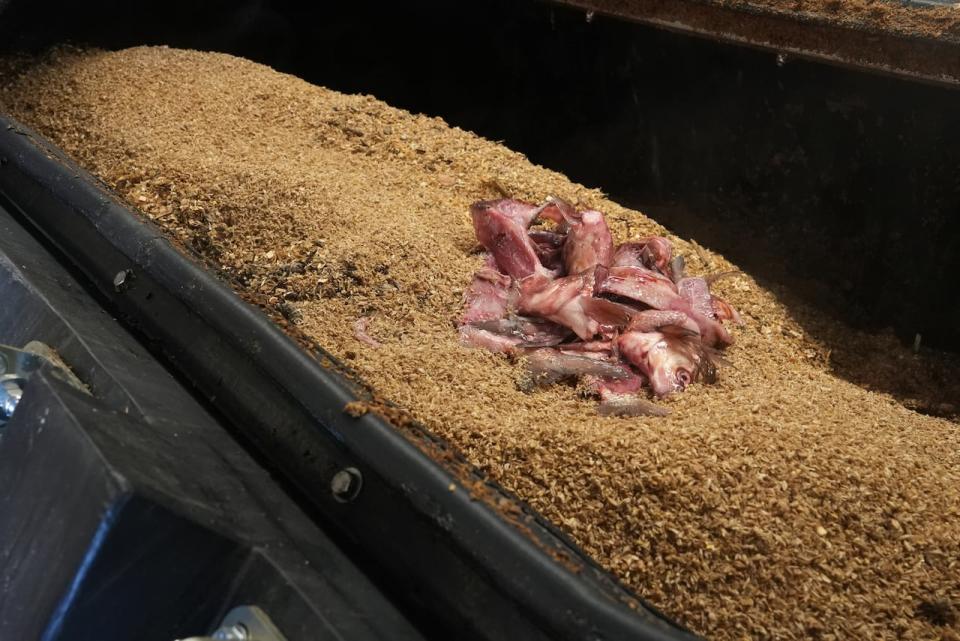
Fish scraps on a bed of spent grain inside the in-vessel composter. (Julie Plourde/Radio-Canada)
The contraption cost $75,000 — 10 per cent covered by territorial funding — and Gignac said it's worth it. Other methods of composting take more time and space, she said, but the in-vessel method will work year-round and can make compost in a matter of days from a fine-tuned recipe.
The composter creates a controlled environment, Gignac said, and she's able to manage the heat and moisture inside. She also sets the daily number of rotations, which slowly pushes the material from one end to the other.
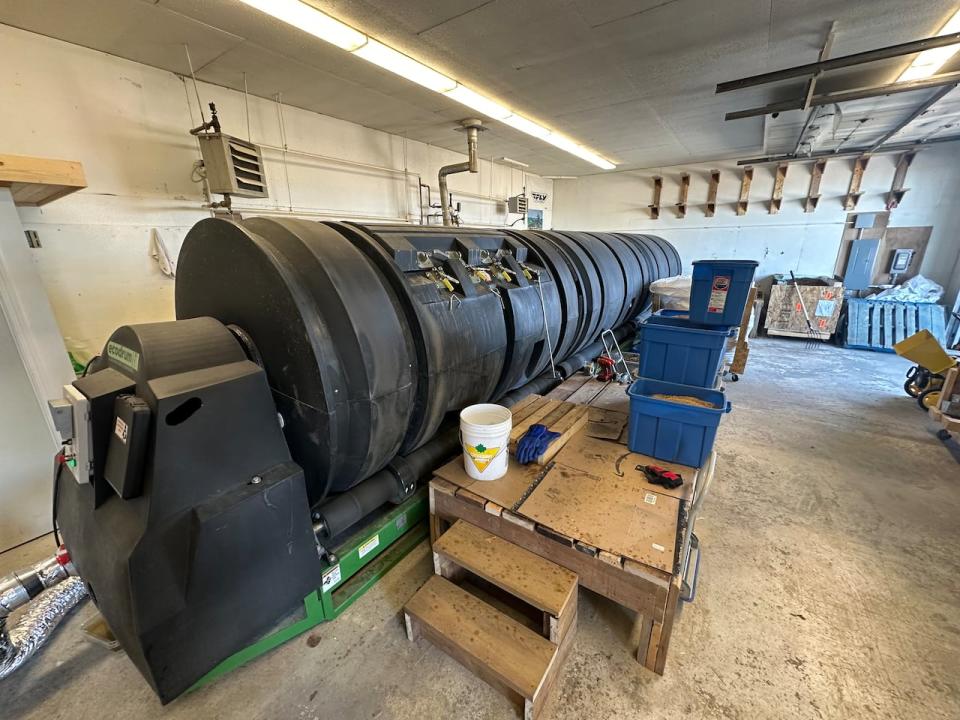
A huge cylindrical composter, tucked inside a building in Yellowknife's Kam Lake industrial area, is a key component of Gignac's business. (Liny Lamberink/CBC)
"I'm super happy with how it looks," Gignac said, inspecting a handful of the product that had tumbled out of the open end. "Right now it's very steamy, it's hot, it's a good dark brown colour. I'm thinking of my tomatoes right now — they're going to love this."
Gignac said the compost needs to cure, or "calm down," for a few weeks after its produced. She's also waiting for test results to see what kind of nutrients the compost contains, which will help the more fastidious gardeners figure out how to use it.
Excitement in the gardening community
France Benoit, the owner and operator of La Refuge Farm in Yellowknife, said the new product appeals to her because it'll be produced locally and will be available year round.
For more than a decade, Benoit has coordinated an annual shipment of chicken manure from Hay River, N.W.T., to fertilize the sprawling vegetable gardens that are integral to her livelihood. Other Yellowknifers have been able to order too. But this year, she's making the switch to fish.
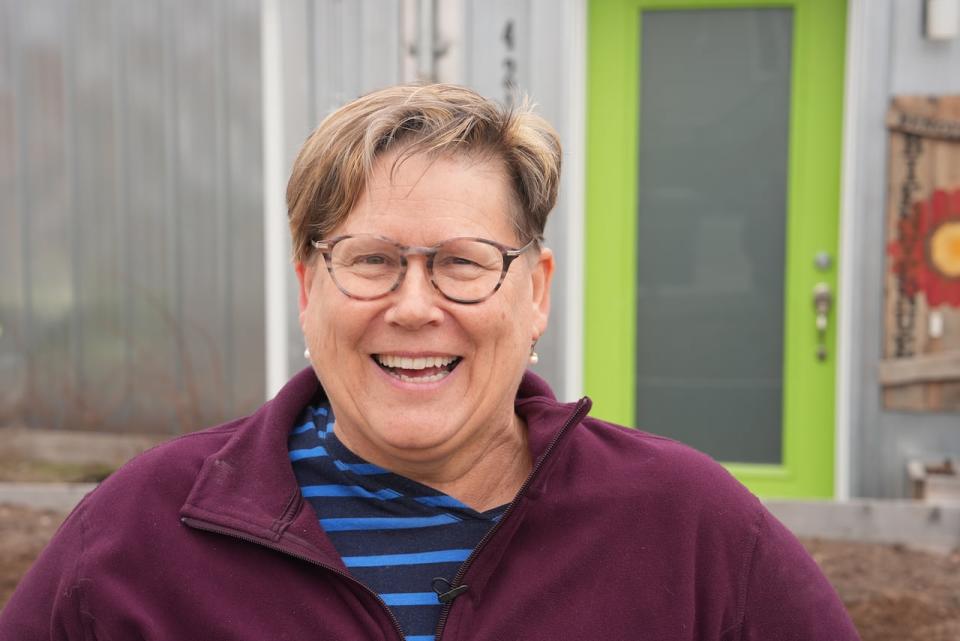
France Benoit is one of Gignac's eager customers. (Julie Plourde/Radio-Canada)
"I always try to make the best environmental choice," she said.
Benoit said she'll use a trowel to put a bit around each seedling, and then a shovel to fill the spaces between the seedlings — about an inch's worth, depending on results from nutrient testing that Gignac is still waiting for.
"It is so well cured that it will not damage the plants at all," said Benoit.
"In the Yellowknife area … it's a very peaty soil that we have, so it does need nutrients," she explained. "I'm really looking forward to using something local."
A load off a fisher woman's mind
Fishing has stopped for the break-up season, but Vaillancourt still had one more bin of scraps ready for Gignac to pick up on Tuesday.
"She's kind of doing my waste management," Vaillancourt said. "It saves me … a huge amount of work, like just the fact that I don't need to haul [the scraps] back. It's so much less heavy lifting that I do already quite enough [of]."
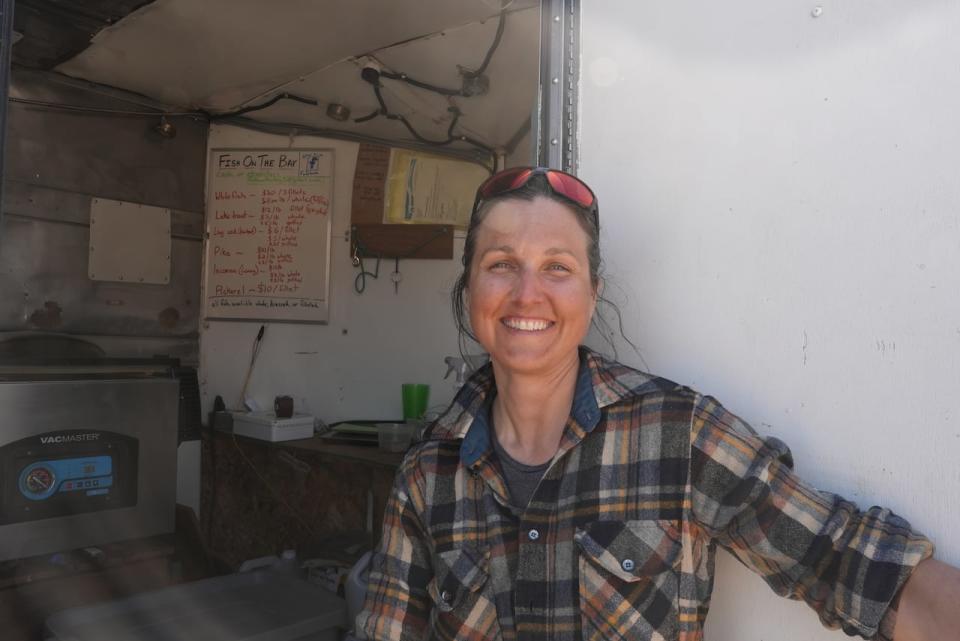
Stéphanie Vaillancourt, the operator of Fish on the Bay, stands in the doorway of her trailer in Old Town. It's where she fillets and sells fish to residents. (Julie Plourde/Radio-Canada)
Putting the fish waste to use also spares Vaillancourt from peoples' suggestions of what she could do with them herself.
"I don't have time, you know. I'm already super busy, stretched really thin," said Vaillancourt.
She appreciates that Gignac had an idea and then — rather than suggesting Vaillancourt take it on — did it herself.
Gignac said she's invested $130,000 into the project so far. The territory's Industry, Tourism and Investment Department covered a small portion of the composter, and gave her funding to come up with a business plan too.
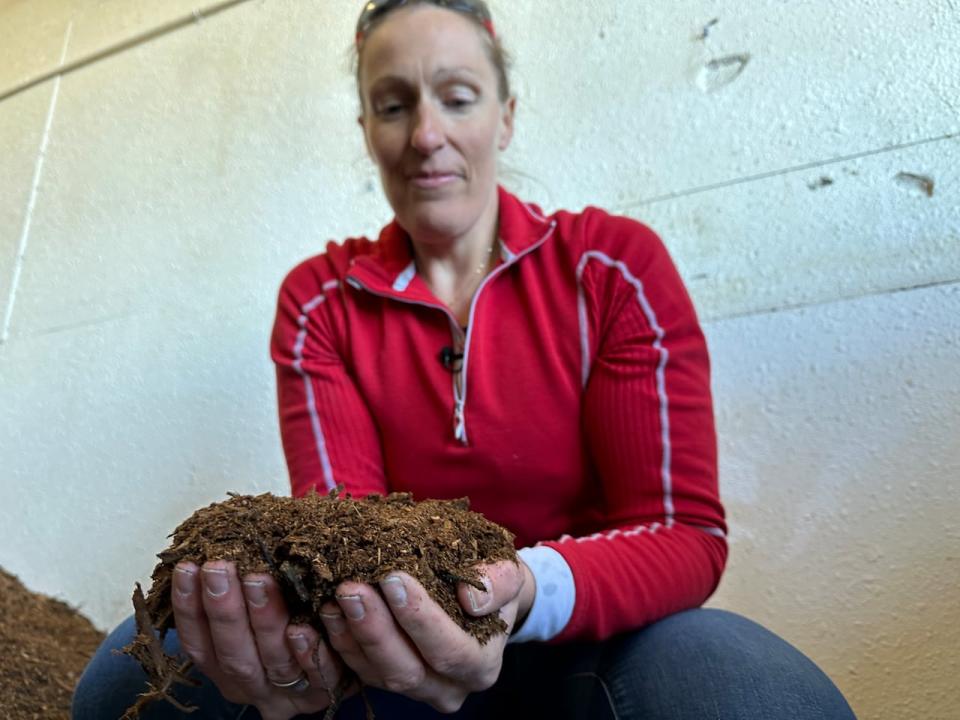
Gignac with a handful of the composted material. 'It's like Christmas,' she said. (Liny Lamberink/CBC)
In the future, Gignac envisions playing with different compost recipes, processing other animal carcasses, and extracting gasses from the composting process for electricity generation. She also wants to try using compost to remediate soil. A ventilation system to help with odour is also in the cards.
Gignac said the journey has taken a lot of effort so far, and it doesn't come without challenges and risk. But she said it's heartening to have a long list of Yellowknife gardeners signed up for her first batch of fish compost.
"Seeing the excitement about what's coming is very encouraging," she said.

